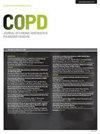利血平煎剂对 LPS 和香烟烟雾诱导的慢性阻塞性肺病小鼠模型的治疗作用
IF 3.1
3区 医学
Q1 Medicine
International Journal of Chronic Obstructive Pulmonary Disease
Pub Date : 2024-04-18
DOI:10.2147/copd.s449521
引用次数: 0
摘要
简介生脉散(LD)是治疗败血症和支气管炎的常用中药。然而,它对慢性阻塞性肺病(COPD)的治疗潜力仍然未知。因此,本研究旨在探讨 LD 在香烟烟雾(CS)联合脂多糖(LPS)诱导的 COPD 小鼠模型中的疗效及其内在机制。方法:采用血栓素-伊红(H&E)染色法观察肺组织的病理改变,采用 ELISA 检测肺组织和支气管肺泡灌洗液(BALF)中的炎症因子水平。此外,还进行了 Western 印迹分析,以评估 p-NF-κB、GDF11、ZO-1 和 Occludin-1 蛋白的表达。使用活菌计数法评估了肠道菌群的变化:结果:在小鼠模型中,服用 LD 能显著减轻肺组织损伤,同时抑制炎症通路 NF-κB 的激活,从而降低促炎因子的水平。此外,LD 还能增强肠道功能蛋白 ZO-1 和 Occludin-1 的表达,从而纠正肠道微生物群的菌群失调:结论:LD作为慢性阻塞性肺病的一种潜在治疗方法前景广阔:慢性阻塞性肺病 生命水煎剂 炎症 肠道菌群本文章由计算机程序翻译,如有差异,请以英文原文为准。
Therapeutic Effects of Lifei Decoction in a Murine Model of COPD Induced by LPS and Cigarette Smoke
Introduction: The Lifei Decoction (LD) is a commonly utilized Chinese medicine for the treatment of sepsis and bronchial inflammation. However, its therapeutic potential in chronic obstructive pulmonary disease (COPD) remains unknown. Therefore, the objective of this study was to investigate the therapeutic efficacy and underlying mechanism of LD in a mouse model of COPD induced by cigarette smoke (CS) combined with lipopolysaccharide (LPS).
Methods: Hematoxylin-eosin (H&E) staining was employed to observe the pathological alterations in lung tissue, while ELISA was utilized for the detection of levels of inflammatory factors in both lung tissue and bronchoalveolar lavage fluid (BALF). Additionally, Western blot analysis was conducted to assess the expression of p-NF-κB, GDF11, ZO-1, and Occludin-1 proteins. The changes in intestinal flora were evaluated using the viable bacteria count method.
Results: The administration of LD demonstrates significant efficacy in mitigating pulmonary tissue damage in a murine model, while concurrently inhibiting the activation of the inflammatory pathway NF-κB to attenuate the levels of pro-inflammatory factors. Moreover, LD exhibits the capacity to enhance the expression of intestinal functional proteins ZO-1 and Occludin-1, thereby rectifying dysbiosis within the gut microbiota.
Conclusion: The LD shows great promise as a potential treatment for COPD.
Keywords: COPD, lifei decoction, inflammation, intestinal flora
Methods: Hematoxylin-eosin (H&E) staining was employed to observe the pathological alterations in lung tissue, while ELISA was utilized for the detection of levels of inflammatory factors in both lung tissue and bronchoalveolar lavage fluid (BALF). Additionally, Western blot analysis was conducted to assess the expression of p-NF-κB, GDF11, ZO-1, and Occludin-1 proteins. The changes in intestinal flora were evaluated using the viable bacteria count method.
Results: The administration of LD demonstrates significant efficacy in mitigating pulmonary tissue damage in a murine model, while concurrently inhibiting the activation of the inflammatory pathway NF-κB to attenuate the levels of pro-inflammatory factors. Moreover, LD exhibits the capacity to enhance the expression of intestinal functional proteins ZO-1 and Occludin-1, thereby rectifying dysbiosis within the gut microbiota.
Conclusion: The LD shows great promise as a potential treatment for COPD.
Keywords: COPD, lifei decoction, inflammation, intestinal flora
求助全文
通过发布文献求助,成功后即可免费获取论文全文。
去求助
来源期刊

International Journal of Chronic Obstructive Pulmonary Disease
RESPIRATORY SYSTEM-
CiteScore
5.10
自引率
10.70%
发文量
372
审稿时长
16 weeks
期刊介绍:
An international, peer-reviewed journal of therapeutics and pharmacology focusing on concise rapid reporting of clinical studies and reviews in COPD. Special focus will be given to the pathophysiological processes underlying the disease, intervention programs, patient focused education, and self management protocols. This journal is directed at specialists and healthcare professionals
 求助内容:
求助内容: 应助结果提醒方式:
应助结果提醒方式:


